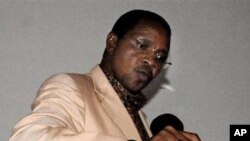Voters in Tanzania went to the polls in what is the most hotly-contested election in the east African country since the reintroduction of multi-party politics in 1992.
The election was Tanzania's fourth nationwide vote since the end of socialism nearly 20 years ago. More than 19 million registered voters were eligible to cast ballots for the president and members of the Tanzanian parliament. Voters on the Zanzibar Archipelago cast ballots for a power-sharing coalition designed to avoid perpetual election violence.
President Jakaya Kikwete and the ruling Chama Cha Mapinduzi Party faced a stern challenge from opposition groups. Mr. Kikwete's main challenger is Wilbrod Slaa of the Party of Democracy and Development.
In Tanzania's economic capital, Dar es Salaam, political analyst Ndimale Tegambwage explained how basic concerns influenced the vote.
"This year's elections are based on specific issues. There are specific issues that are being advanced by the opposition in Tanzania," said Tegambwage. "The issue is no longer to replace the ruling party. That has been there for at least 50 years now. The issues on the economy, on education specifically, on afia - health - on transport, on how to manage the national resources and how to utilize them for the benefit of the population."
The vote is expected to be the closest in Tanzania's nearly two decades of multi-party politics, but analysts expect Mr. Kikwete and his party to be returned to office.
Opposition candidates have raised concerns over the vote's credibility. Mr. Kikwete says the election will be credible, but Tegambwage told VOA there were some incidents of intimidation during the campaigns.
"They could get a clear lead because they are in the office and they will never give up and they are great manipulators and, of late, there have been some dirty campaigns: that when the opposition comes to power there will be war. So these intimidatory statements, on radio, on television - all these are really hitting on the population that would have voted for the opposition," he said. "But the opposition still holds that they can win, especially in the case of president, not MPs."
The ruling Chama Cha Mapinduzi party has been in power since independence from Britain in 1961. The recent surge in opposition is due, in part, to corruption scandals that have hit Tanzania in the past few years.
Mr. Kikwete campaigned in 2005 on an anti-corruption platform. But during his first term, it was revealed the central bank had given more than $120-million to local firms that existed in name only and performed no services.
A 2008 parliamentary report also found that Tanzania lost more than $170-million when a non-existent U.S. power-company was contracted to supply power-generators during energy-shortages in 2006.




